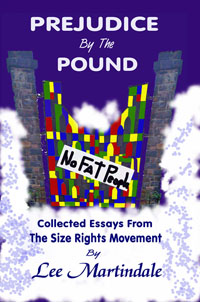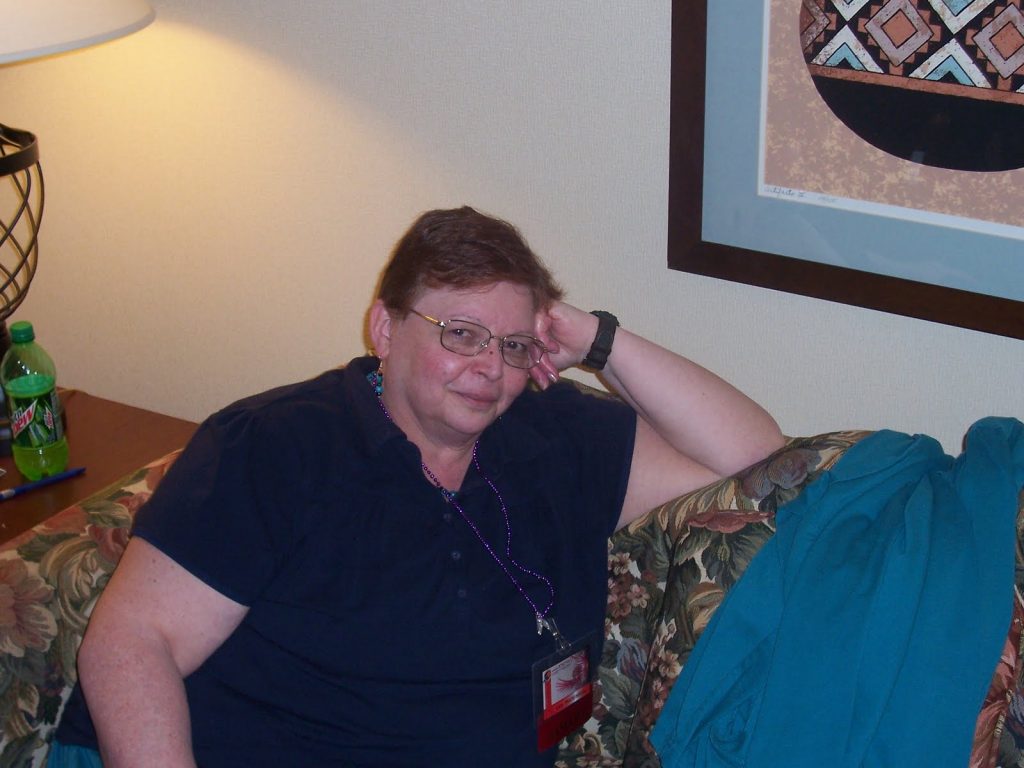After 20 years on the forefront of the size positive movement, Lee Martindale stepped back to concentrate on science fiction. After 16 years serving in a variety of leadership capacities with the SFWA, she is again stepping back to concentrate on writing, editing, and publishing.
CARL SLAUGHTER: Such a Pretty Face is an anthology of size positive stories. How did you find so many authors with stories on this theme?
LEE MARTINDALE: The old-fashioned way – by announcing a reading period, putting out guidelines well in advance of the reading period, and giving consideration to any story received that met the guidelines. I already knew that people were writing, reading, and enjoying stories with lead characters on the upper end of the size diversity spectrum. I’d been publishing stories like that in Rump Parliament Magazine for nearly a decade prior to the anthology, and selling a few of my own – “Neighborhood Watch” in Marion Zimmer Bradley’s Fantasy Magazine, “Combat Shopping” in Esther Friesner’s Turn The Other Chick come to mind. Where there’s a market and a clear set of guidelines for what the editor does and does not want to see, good writers will hit the mark.
CS: The Ladies of Trade Town includes werewolves, vampires, cyborgs, robots, steampunk, space opera, time travel, alternate history, among others. The main characters are all prostitutes. How integral and how explicit is the sex in the stories?
LM: The short answer to both is “It isn’t.” The longer answer is that the guidelines for Trade Town started with two givens: that, when it came to what was being bought and sold, sex wasn’t even close to the top of the list, and that readers likely already knew the mechanics. I asked for stories that concentrated on what else was being offered, who was doing the offering, and why.
CS: What was the criteria for selection in Bard’s Road?
LM: Bard’s Road, being a collection of my own work, began with stories that had sold over the years, most of which were long out-of-print. Four of them, my first story sale to Marion Zimmer Bradley’s Snows of Darkover anthology, and three pieces for Selina Rosen’s Bubbas of the Apocalype anthology series, two co-written with Bradley H. Sinor, were left out due to their shared-world settings. Instead, I included four unpublished stories that fit into existing story cycles.
CS: What’s your involvement in the size positive movement?
 LM: Between the early 1980s and 2002, I was heavily involved in size issues activism, particularly advocating for an end to prejudice in the health care and insurance industries, and adding “weight or size” to existing anti-discrimination law. In 1992, I began editing and publishing Rump Parliament Magazine as a teaching tool and gathering place for activists, a dissemination point for news and calls to action, and a staging platform for various projects. I also did keynote speeches and workshops, served as the U.S. Coordinator for the first five years of International No Diet Day, and frequently provided comment to various media outlets on size-related news stories. A few years ago, I published a compilation of my editorials, essays, and articles from Rump Parliament under the title Prejudice By The Pound. It was sadly surprising just how many of them were relevant all these years later.
LM: Between the early 1980s and 2002, I was heavily involved in size issues activism, particularly advocating for an end to prejudice in the health care and insurance industries, and adding “weight or size” to existing anti-discrimination law. In 1992, I began editing and publishing Rump Parliament Magazine as a teaching tool and gathering place for activists, a dissemination point for news and calls to action, and a staging platform for various projects. I also did keynote speeches and workshops, served as the U.S. Coordinator for the first five years of International No Diet Day, and frequently provided comment to various media outlets on size-related news stories. A few years ago, I published a compilation of my editorials, essays, and articles from Rump Parliament under the title Prejudice By The Pound. It was sadly surprising just how many of them were relevant all these years later.
I still advocate for size issues, do the occasional presentation or speaking engagement, but since 2002, my time and energies have been largely centered on making a living as an SF&F writer, anthologist, and publisher.
CS: What exactly is a SFWA ombudsman and what does that role involve?
LM: An ombudsman is a members’ advocate. SFWA’s ombudsman is an alternative channel for communicating member concerns to the Board of Directors, registering complaints, and seeking resolution of issues involving the organization or individual members. The role involves discretion, mediation skills, the ability to maintain neutrality, and the ability to function independently of the President and Board. If necessary, it involves the ability to guide the President and Board to reasoned consideration to a particular member concern or issue.
CS: Same question for director at large.
LM: Of the nine elected members of the SFWA Board of Directors, there are five directors-at-large specifically tasked by the Bylaws with “facilitating communications and representing concerns of the membership to the Board.” They’re the members’ representatives during discussions and Board votes. Other duties include serving as Board liaisons to committees and various projects as assigned by the President.
CS: When the SFWA’s grievance committee hears a case, who has a grievance with whom and how is it resolved.
LM: I’d love to answer that one, but what happens in the Grievance Committee stays in the Grievance Committee.
CS: What’s your involvement with the bylaws committee?
LM: Until the reorganization, SFWA operated under a set of bylaws that were convoluted, contradictory, open to creative interpretation, and nearly impossible to change. During six years in the early 2000s, I chaired a committee involved with trying to fix them, with limited success. I’m happy to say that the bylaws that went into effect with the organization incorporated a number of the changes we tried to make.
CS: Same question for the election committee.
LM: I served three years on the Election Committee chaired by Greg Feeley.
CS: What’s on the horizon for the SFWA?
LM: Not a clue. What I *hope* is that it learns to value and utilize the powerful combination of experience and enthusiasm at its disposal.
CS: What’s on the horizon for Lee Martindale?
LM: After sixteen years of serving SFWA in various nuts-and-bolts volunteer capacities, including the last six years as a member of the Board of Directors, it’s time for a short break. My plans for the newly-liberated free time involve much more writing, including tackling a novel. I have a couple of anthology projects in mind, as well. And there’s this to-be-read stack that’s been growing steadily over the years…
- Website: http://www.harphaven.net/
- Blog: http://lee-martindale.livejournal.com/
- Facebook: https://www.facebook.com/lee.martindale
- Twitter: https://twitter.com/lee_harphaven
- Goodreads: http://www.goodreads.com/author/show/663804.Lee_Martindale
Discover more from File 770
Subscribe to get the latest posts to your email.






“DOH!”
;-D
Hey… I tried to volunteer… they even found a spot for me… then said, “Ooops! Don’t want you after all.” (Something about not having paid my current dues – which I had a REALLY GOOD excuse for!!!.) 🙁
As for tackling a novel, I’d suggest you pre-position it on a bed lest you skin your knees or get grass stains.